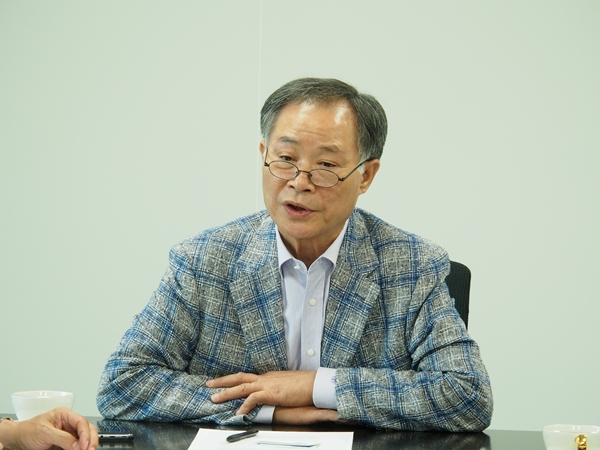Drug traders' group hosts international event on Aug. 21
Korea Pharmaceutical Traders Association (KPTA) said it would open a large-scale international pharmaceutical exhibition, “CPhI (Convention on Pharmaceutical Ingredients) Korea 2019,” in Seoul on Aug. 21.
Two-hundred-and-twenty companies firms (129 foreign, 91 domestic) from 18 countries have registered for the association’s sixth annual event, which has invited more than 5,300 pharmaceutical experts from home and abroad.
“There will be so many things to see this year,” said Oh Jang-suk, chairman of KPTA. “Our association will make every effort to help local pharmaceutical companies enter the overseas market.”
Oh held a news conference for reporters covering the Ministry of Food and Drug Safety at the KPTA’s head office on Wednesday. He shared the details of the upcoming CPhI Korea event and the association’s plan to promote local companies’ drug exports.

Domestic firms participating in CPhI Korea 2019 include Samoh Pharm, DongKook Pharmaceutical, Kolmar Korea, Caregen, Inist, Kukjeon Pharm, Phil Inter Pharma, Rihu Healthcare, SungYi Pharm, Huons, Ageing & Life Science, Sinsin Pharmaceutical, and EstechPharma. New participants include Jeil Pharmaceutical, Samchun Chemicals, Bioall, ATI Korea, Juyeong NS, Cosmax Bio, and Lubrizol Korea.
Question: CPhI Korea is the nation’s largest pharmaceutical event. The size of the event is expected to grow this year compared to that of 2018. What do you think has made the show keep growing?
Answer: CPhI Korea this year will be the sixth. Last year, 190 pharmaceutical firms from 18 countries applied for participation and 4,990 officials from 64 countries attended the event. The number of drugmakers increased to 220 this year, and we expect that more than 5,300 people will visit the show.
The event was able to grow because Korean drugmakers have enthusiasm for exports. The show allows them to build a relationship with new partners around the world and reinforce relations with existing buyers. I think that is why local drug companies support our event.
Q: Among the participating companies, we can barely see top players. Why is that?
A: Top players already have their established networks overseas, and they can have their booth at CPhI Worldwide. It means that they don’t need the association’s help. KPTA thinks small- and medium-sized enterprises (SMEs) need much more help, preparing various methods to support them.
Q: Which program will draw the most attention at CPhI Korea?
A: With Korea’s joining Pharmaceutical Inspection Co-operation Scheme (PIC/S) and being listed on the EU’s “whitelist,” Korean companies are showing a keen interest in the European pharmaceutical market and procedures for GMP (Good Manufacturing Practice) certification. So, we invited European Directorate for the Quality of Medicines’ head of the CEP (Certificate of Suitability to the monographs of the European Pharmacopoeia) team, who will speak on how to make the most of CEP program.
Companies without several years of export experience do not know a foreign country’s regulations. So, we prepared the event to help obtain approval overseas.
Q: KPTA is expected to sign a memorandum of understanding with Chilean counterpart at the upcoming event. How will the MOU affect the pharmaceutical sector?
A: To share pharmaceutical market information and promote cooperation between Korea and Chile, KPTA plans to sign an MOU with Chile’s PROLMED on Aug. 21. PROLMED is a representative pharmaceutical association in Chile. Members of the Chilean group have sales networks not only in Chile but in Brazil and Argentina. The group is expected to help Korean drug companies reach the Central and South American market.
Q: What are KPTA’s activities to promote exports of Korean pharmaceutical products?
A: We plan to focus on businesses where local companies can achieve tangible outcomes. We support their participation in international pharmaceutical exhibitions, help them dispatch officials to pioneer in a foreign market, hold export counseling events with international buyers, provide briefings on how to register in the overseas market, and support export-led companies. We are also mulling over offering an educational program to nurture professionals for export.
Q: In Korea, only a limited number of drug companies operate an overseas business. Do you have suggestions to overcome this problem or any comments for industry officials?
A: If a company wants to enter the global market, it has to have competitiveness in quality. Absolute numbers evaluate quality, but competitiveness in quality is a relative value, depending on a targeted market. To secure competitiveness in quality, a company should introduce manufacturing and quality control standards on par with those of peers in advanced countries. It also needs to raise experts in marketing to develop a targeted product and set up export policies based on international marketing strategies.
Many Korean companies are facing difficulties now because advanced countries are pushing to lower drug prices, and developing countries are protecting their domestic industries. Korean drug firms can overcome this situation by diversifying export target markets. KPTA will help enhance ties between Korea and other countries and actively participate in international events to promote the Korean pharmaceutical industry.

